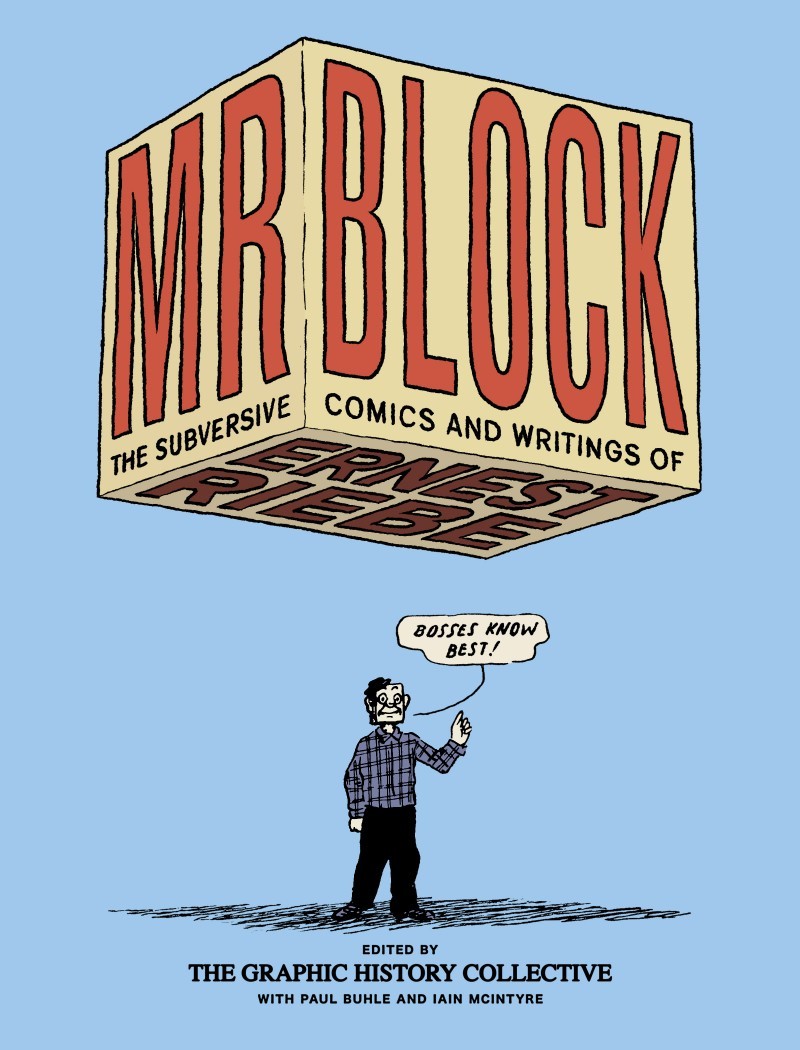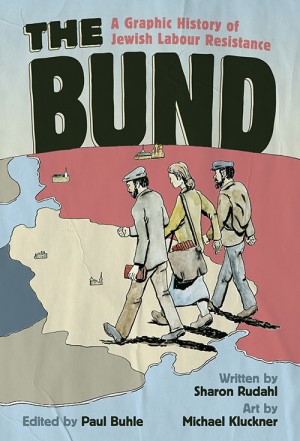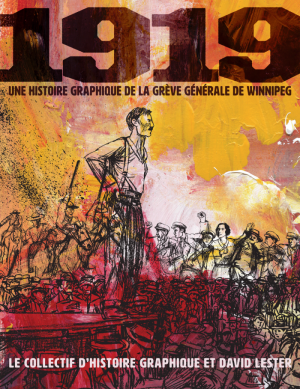
Mr. Block
The Subversive Comics and Writings of Ernest Riebe
Before the Golden Age of comic books, there was Mr. Block: a bumbling, boss-loving, anti-union blockhead, brought to life over a hundred years ago by subversive cartoonist Ernest Riebe.
A dedicated labour activist and member of the Industrial Workers of the World, Riebe dreamed up his iconic, union-hating anti-hero to satirize conservative workers’ faith in the capitalist system that exploits them. This wickedly funny anthology of Riebe’s writings and comics is a treasure trove of radical 20th-century art and an essential addition to the bookshelves of comics lovers, historians, and labour activists alike.
As income inequality skyrockets and the collective power of the working class is undermined, the lessons from Mr. Block’s misadventures and misbeliefs are as relevant today as ever. Building the new world from the ashes of the old demands many tools—and laughter will always be one of them.
Praise
“It is both refreshing and demoralizing how many of these jokes could have been written today. Sharp, funny, absurd—we can see the end to Blockism within our lifetime.”
– Michael DeForge, author of Birds of Maine
“The strange thing about reading these comics from over a hundred years ago is that they don’t seem all that old. Our country is still full of people who believe that the best way to improve their situation is to go along with what the system tells them to do: to blame their troubles on immigrants or criminals or unproven conspiracies, rather than finding out what’s really going on. We continue to be a nation of blockheads.”
– Seth Tobocman, founding editor of World War 3 Illustrated, author of War In the Neighborhood
“Ernest Riebe’s Mr. Block stands alone in cartoon history. He’s a character who votes against his own self-interest and adamantly believes he’s an apprentice to millionaires. If he just does as he’s told by the man on top, he can storm the Capitol and grab those Benjamins. Old Mr. Block remains a hilariously modern knucklehead who reminds us why we need solidarity against oppressive hucksters and to not forget the power of a good laugh along the way.”
– Peter Kuper, founding editor of World War 3 Illustrated, author of Ruins
“Mr. Block is back and just in time for a new generation of militant workers at Amazon, Starbucks, and beyond! Three cheers for Paul Buhle, Iain McIntyre, and the Graphic History Collective for this powerful recovery of working-class history and humour.”
– Marcus Rediker, co-author of The Many-Headed Hydra: Sailors, Slaves, Commoners, and the Hidden History of the Revolutionary Atlantic
“As we take pleasure from the spare look and wicked humor of these send-ups of the retrograde worker and the even more retrograde institutions that ensnare him, how they teach deserves attention too. We need to learn the lessons regarding church, state, and boss that Mr. Block refused. Equally, we need to think about how the artist skewers the destructive actions and beliefs of fellow workers without letting their rulers off the hook. Study and chuckle.”
– David Roediger, University of Kansas, author of The Sinking Middle Class
“When it comes to getting schooled and laughing along the way, there’s nothing like the satirical comics of Wobbly Ernest Riebe. His legendary Mr. Block series comes back to life in this funny, smart, and timely new collection.”
– Peter Cole, author of Ben Fletcher: The Life and Times of a Black Wobbly
“More than a hundred years ago, Ernest Riebe used Mr. Block to diagnose the critical diseases that afflicted working people: capitalism, government of, by, and for the boss, co-opted political parties, and labor bureaucrats. The diseases are still with us, and so Riebe’s antidote has lost none of its potency: a labour movement that is militant, radical, and democratic. The cartoons have lost none of their accuracy or relevance, and this collection, accompanied by more recent historical analysis and appraisal, is a valuable tool for activists, organizers, and educators. It’s also a lot of fun.”
– Mark Leier, labour historian, Simon Fraser University
“Ernest Riebe’s Mr. Block was one of the first radical comic strips, and it remains one of the best. This book is a treasure for activists, historians, and comic enthusiasts alike!”
– Kenyon Zimmer, co-editor of Wobblies of the World: A Global History of the IWW
Contents
| Preface by Paul Buhle | |
| Introduction by the Graphic History Collective | |
| PART 1: | ERNEST RIEBE’S MR. BLOCK |
| Selected Comic Strips and Illustrations, 1912–24 | |
| Mr. Block—He Shows His Superiority, 1912 | |
| Mr. Block—He Tries the Courts, 1912 | |
| Mr. Block—He Tries Political Action, 1912 | |
| Mr. Block—He Meets Others, 1912 | |
| Mr. Block—He Invests His Savings, 1912 | |
| Mr. Block—He Don’t Favor Sabotage, 1912 | |
| Mr. Block—He Celebrates Christmas, 1912 | |
| Mr. Block—He Works in the Woods, 1912 | |
| Mr. Block—He Fails to Connect, 1913 | |
| Mr. Block—He Reads of a Good Job, 1913 | |
| Mr. Block—He Peddles Signs, 1913 | |
| Mr. Block—He Becomes a Salesman, 1913 | |
| Mr. Block—He Gets Pinched on Suspicion, 1913 | |
| Mr. Block—He Becomes a Victim of Charity, 1913 | |
| Mr. Block—He Scabs at Lawrence / He Tries to be a Union Scab, 1913 | |
| Mr. Block—He Learns that the A.F.L. Is Known in Montana, 1913 | |
| Mr. Block—He Gets Scabunionitis, 1913 | |
| Mr. Block—He Learns Something about Craft Jurisdiction, 1913 | |
| Mr. Block—He Was One of the Victims, 1913 | |
| Mr. Block—He Gets Hurt, 1913 | |
| Mr. Block—He Makes a Bum Detective, 1913 | |
| Mr. Block—He Finds that Charity Covers a Multitude of “Skins,” 1913 | |
| Mr. Block—Before and After the Election, 1913 | |
| Mr. Block—His May Day Dream Didn’t Come True, 1913 | |
| Mr. Block—He Learns the Power of Gold, 1913 | |
| Mr. Block’s Mind, 1913 / Mr. Block in Pamphlet Form, 1913 | |
| Images from Mr. Block: Twenty-Four Cartoons of the Mr. Block Series, 1913 | |
| Mr. Block—He Gets Out of the “Can” Again, 1913 | |
| Mr. Block—He Takes His Flag Along / He Gets Stung, 1913 | |
| Mr. Block—He Fails to Interest Mrs. Block in Democracy, 1913 | |
| Mr. Block—He Has Some Uplifting Done, 1913 | |
| Mr. Block—He Almost Loses ’Em, 1913 | |
| Mr. Block—He Has an Awful Dream, 1913 | |
| Mr. Block—He Inherits $2000, 1913 | |
| Mr. Block—He Busts the Alarm Clock, 1913 | |
| Mr. Block—He Becomes an Employer, 1913 | |
| Mr. Block—He Goes Broke, 1913 | |
| Mr. Block—He Goes Harvesting, 1913 | |
| Mr. Block—He Gets a Job, 1913 | |
| Mr. Block—He Goes to the Dakota Harvest, 1913 | |
| Mr. Block—He Finds a Place to Flop, 1913 | |
| Mr. Block—His Patriotism Is Appreciated, 1913 | |
| Mr. Block—He Leaves the Harvest with His Stake, 1913 | |
| Mr. Block—He Joins the I.W.W., 1913 | |
| Mr. Block—He Becomes an Editor, 1913 | |
| Mr. Block—He Isn’t Afraid of the Boss, 1913 | |
| Mr. Block—He Is One of Those Cascarets, 1914 | |
| Mr. Block—He Is Rewarded for Helping His Boss, 1914 | |
| Mr. Block—He Waits for a Job at Ford’s, 1914 | |
| When Block Meets Block, 1914 | |
| Mr. Block—Bull Con Keeps Him Going, 1914 | |
| The Thinker! 1914 | |
| Mr. Block—Insults Members of the I.W.W., 1914 | |
| Mr. Block—He Races for a Job, 1914 | |
| Mr. Block—He’s Against Organization, 1914 | |
| Mr. Block—He Loses His Job, 1913 / He Receives a Christmas Present, 1913 | |
| Mr. Block—He’s Still Waiting for Better Conditions, 1919 | |
| Mr. Block—He Is a Member of the A.A.A.A., 1919 | |
| Mr. Block Has the Blues, 1921 | |
| Mr. Block and Mr. Bone, 1924 | |
| Mr. Block and Mr. Bone, 1924 | |
| Mr. Block and Mr. Bone—They Use California Products and Receive Compensation, 1924 | |
| Mr. Block and Mr. Bone—Mr. Block Fails to Lick the Master’s Boots and Feels Regret, 1924 | |
| Mr. Block and Mr. Bone—Mr. Block Forms an Acquaintance with a Millionaire, 1924 | |
| Mr. Block and Mr. Bone, 1924 | |
| Mr. Block and Mr. Bone, 1924 | |
| Mr. Block and Mrs. Block, 1924 | |
| Mr. Block and the Profiteers, 1919 | |
| A Job / Political Bunk, 1920 | |
| The Majority: A One Act Play, 1921 | |
| PART 2: | RECEPTION AND COMMENTARY |
| Mr. Block lyrics by Joe Hill, 1913 | |
| Introductory by Walker C. Smith, 1913 | |
| Ernest Riebe and Mr. Block essay by Franklin Rosemont, 1984 | |
| I Object to Anarchism in this Boxcar comic strip by Nick Thorkelson, 2005 | |
| Mr. Block reprint by Bryan D. Palmer and Dylan Miner from the One Big Union exhibit, 2019 | |
| Acknowledgements |








